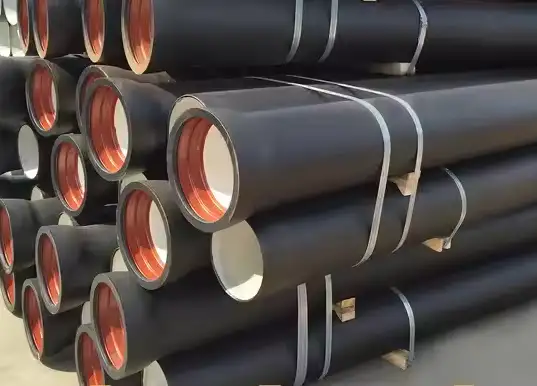Ductile iron pipes are widely used in water distribution systems due to their strength and durability. During installation, lubricants are often applied to facilitate the joining of pipe sections. Tyler Pipe offers various lubricants, including the TY-SEAL® product line. This article examines whether Tyler grease is suitable for use with ductile iron pipes, focusing on the TY-SEAL® lubricant.

🛠️ Understanding Tyler Grease (TY-SEAL®)
Tyler Pipe’s TY-SEAL® is a pipe joint lubricant designed to ease the assembly of hub and spigot cast iron soil pipes and fittings. It is a one-piece compression gasket made of Neoprene, ensuring a secure seal between pipe joints. The lubricant is formulated to prevent gasket damage and facilitate smooth jointing.
🔍 Compatibility with Ductile Iron Pipe
While TY-SEAL® is primarily intended for cast iron soil pipes, its compatibility with ductile iron pipes depends on several factors:
-
Pipe Material: Ductile iron pipes are similar to cast iron in composition but differ in their manufacturing process.
-
Gasket Material: The Neoprene gaskets used in TY-SEAL® are designed to work with the specific surface characteristics of cast iron.
-
Lubricant Composition: The lubricant’s formulation may interact differently with ductile iron surfaces.
Therefore, while TY-SEAL® may function with ductile iron pipes, it’s essential to consult the pipe manufacturer’s recommendations to ensure compatibility and optimal performance.
✅ Recommended Practices
To ensure the integrity and longevity of ductile iron pipe installations:
-
Manufacturer’s Recommendations: Always follow the lubricant guidelines provided by the ductile iron pipe manufacturer.
-
Lubricant Application: Apply the lubricant to the exposed surface of the gasket and the plain end of the pipe, avoiding the bell socket area.
-
Avoid Over-Lubrication: Excess lubricant can attract dirt and debris, potentially compromising the seal.
-
Inspection: Regularly inspect joints for signs of leakage or wear.
📊 Comparison: TY-SEAL® vs. Other Lubricants
| Feature | TY-SEAL® Lubricant | Alternative Lubricants |
|---|---|---|
| Intended Use | Cast iron soil pipes | Various pipe materials |
| Gasket Compatibility | Neoprene gaskets | Depends on formulation |
| Application Method | Brush-on | Spray or brush |
| Manufacturer | Tyler Pipe | Various manufacturers |
| Availability | Limited to Tyler Pipe distributors | Widely available |
📹 Related Video
For a visual demonstration of pipe joint lubrication, watch the following video:
❓ Frequently Asked Questions (FAQs)
1. Can TY-SEAL® lubricant be used with ductile iron pipes?
While TY-SEAL® is designed for cast iron soil pipes, it may be used with ductile iron pipes. However, it’s crucial to consult the ductile iron pipe manufacturer’s guidelines to ensure compatibility and prevent potential issues.
2. What are the risks of using the wrong lubricant with ductile iron pipes?
Using an incompatible lubricant can lead to gasket damage, joint leakage, and reduced system longevity. It’s essential to use lubricants recommended by the pipe manufacturer to maintain system integrity.
3. How should lubricant be applied to ductile iron pipe joints?
Lubricant should be applied to the exposed surface of the gasket and the plain end of the pipe. Avoid applying lubricant to the bell socket area to ensure proper gasket compression and sealing.
4. Are there alternative lubricants recommended for ductile iron pipes?
Yes, manufacturers often provide specific lubricants formulated for use with ductile iron pipes. It’s advisable to use these recommended lubricants to ensure optimal performance and compatibility.
5. Can over-lubrication cause problems in ductile iron pipe installations?
Yes, excessive lubricant can attract dirt and debris, potentially compromising the seal and leading to joint failure. Apply lubricant sparingly and according to manufacturer instructions.
6. Where can I purchase TY-SEAL® lubricant?
TY-SEAL® lubricant is available through Tyler Pipe distributors. Check with local suppliers or visit the Tyler Pipe website for more information on purchasing options.
References:
- TY-SEAL® Lubricant and Gasket System – Tyler Pipe Official Website
- Installation Guide for Ductile Iron Pipe – Ductile Iron Pipe Research Association (DIPRA)
- ASTM F1674-96(2021) – Standard Test Method for Joint Sealant Compatibility with Plastic Pipe Materials
- Joint Assembly Instructions for Ductile Iron Pipe – AMERICAN Cast Iron Pipe Company (ACIPCO)
- Ductile Iron Pipe – Wikipedia

